We couldn’t drop off our gear until half past 6 because the stage is a shooting range during the day. The venue, aptly named the Gun Club, was scattered with gun shells and the human shaped targets watch over the drummer’s back when playing.
We couldn’t drop off our gear until half past 6 because the stage is a shooting range during the day. The venue, aptly named the Gun Club, was scattered with gun shells and the human shaped targets watch over the drummer’s back when playing.
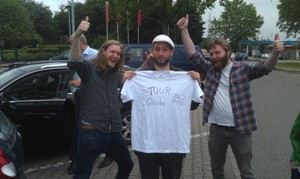
An epic tale of beards, meat, Jugo-nostalgia and Cyrillic in two parts, from one of Holland’s best bands, WOLVON.
21-06, 20.30. Linz, Austria.
We left for Bratislava this morning at 7. Or at least that was the plan. Luckily both bands experienced the same type of delay; commonly referred to as being “rock and roll.” No harm was done. We ended up at our first meeting point, a gas station somewhere in the vicinity of Kassel, roughly about the same time as the other guys. These other guys, (Neon Rainbows), left Rotterdam with the bulk of the backline and a brand new guitarist in the back, driving a bluish black Volkswagen van which was repaired for touring purposes just days before. Besides the new guy Stefan, (Misery Kids), Neon Rainbows are Arnold, (drums: bismuth, ex-feverdream, at no bikini beach), René, (guitar and vocals: ex-feverdream, at no bikini beach, ex-Jimmy Barock), and Youri (bass: ex-the Hands). Some of the Rainbows were nibbling on the remains of their morning bratwurst upon our arrival…
We, WOLVON, hail from Groningen and Amsterdam, and are traveling in a Nissan Almera, blessed with an extra tank containing the sweet substance that will hopefully relieve some of the strain on our ever-so-tight budget. Our car holds me, Bram (on drums and vocals: ex-Sexton Creeps), Ike, (guitar and vocals: ex- The Richer Tree), and Ruben (bass). The last, and quite probably the most important member of our crew is Koen, who has lived in Macedonia for some time working as an EVS via Platform Spartak, and has arranged the entire tour. We meet after the first two hours of our 16 hour drive to Slovakia in a clinically clean autohoff smelling of Deutsche Grundlichkeit, and as we greeted each other, the exciting feeling arose that the tour had officially started. We exchanged walky-talkies for on-road communicating and put our gear in the van in exchange for Koen. Could’ve been worse.
The sound that the engine of the Volkswagen made when we first set off from Kassel was somewhat reminiscent of the noise created by the small piece of cardboard we used to stick between the spokes of our bicycle to emulate a real, working engine, back when we were kids. This time however, the sound indicated a very real engine, not working, or at least not as it should. Fear mixed with our recently acquired euphoric feeling as Koen announced that it was in fact not a garage where the van was left for repairs just two days ago, but at some friend of Arnold’s. Cigarettes were smoked in silence, as Arnold stood 20 meters away, talking on the phone with his friend the mechanic, whilst gesturing heavily. A small delegation of our posse, joined by German tour-bus drivers, gathered around the open hood of the van as if it were a bonfire of sorts, exchanging assumptive theories about the various parts that might be source of the sound.
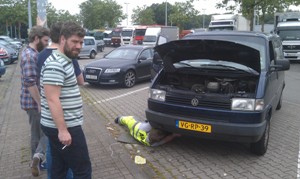
Oofph no
Desperation prevailed when a shiny yellow car with fluorescent signs passed through the parking lot, looking to help a fellow automobilist in need. The mechanic gentlemanly agreed to take a look at the van, which still propelled sounds of dying machinery across the asphalt. No carburetor dung as of yet. After 5 minutes, a missing bolt was replaced and we were back on track. It would’ve been disastrous to be seeing the inside of a German garage for a day, just after crossing the first border. Since then it has mostly been German and Austrian roads and an exchange of “copy thats”, “Rogers,” and “Breaky-Breakies.” It’s raining and we haven’t seen a single mountain while passing trough the valleys Austria. Just a couple of more hours to Bratislava.
24-06, 17.30. Nis, Serbia.
We arrived at 2 ‘o clock at night at the flat of Iva, our host in Bratislava. Deadbeat from our journey we rode the elevator to the 11th floor of the new project flat at the edge of the city. Her apartment had 10 angled outer walls, 5 beds that she used in turns, secret compartments and a view of both Austria and Hungary on a clear day. She lived just a few kilometres from where the Iron Curtain once was, the border between East and West. We sat on the balcony drinking beer and some traditional liquor from a brand that was, ironically, named Jellyneck, talking about the former Yugoslavia with our lovely host. When we could see the windmills of Austria we decided it was time to hit the hay in order to catch some rest for the trip to the Serbian capital the next day.
The estimated time it would take us to get to Belgrade was around 6 hours, so we left Bratislava at 14.00.
It would be an easy ride compared to the day before, and both bands were in good spirits. We knew we were going to stay at a friend of Koen’s, and we wouldn’t have to play until the next day, so we were all psyched to have a night out in the city that apparently has the best night life in Europe. We crossed Hungary with relative ease and arrived at the Hungarian-Serbian border at 18.30. A dry and desolate landscape, we were hassled by a procession of sunburned men cleaning our windows after we made clear that we were not interested in their services. They lurked around our car for half an hour, calling us nasty names in Hungarian and giving us the evil eye because we refused to pay them and the criminal organization for which they most likely worked.
We past the Hungarian side and entered a no-mans land filled with crumbling concrete buildings, as we trotted on to our first “real” border which would take us out of the European Union. We hadn’t been checked thus far but knew that this time around it might get tricky, partly because we didn’t have an official document listing all our gear, (known as an Ata Carnet), because the deposit to get one was more expensive than the entire tour itself. We followed the van up to the booth, passports in hand, praying for a smooth passage. The van passed the booth, we watched in silence. It was still going forward after 5 meters, and we rode up to the barrier. So far so good.
As the guy in the booth checked our passports he cursed silently upon looking at the stamps in Koen’s passport, a result of all his visits to Kosovo. Kosovo is still not recognized by the Serbians as being an independent state since the 1999 conflict which eventually lead to the separation of this southern and industrially rich part of former Yugoslavia. While Ike talked with the officer in the booth the dreaded orange hue of the van’s indicator light started flickering in the corner of my eye. He pulled over next to a car that the customs officers were emptying in its entirety. Fuck.
The waiting commenced. The purpose of the Ata Carnet is to limit the illegal import and export of goods. To compensate for this lack of official documentation, we made a list of our gear ourselves, including ownership and estimated values. As comprehensive as it was unofficial, we hoped a good-humored customs officer would make it official with his magic stamp. After an hour it was made clear that the eleven paged document, including the exact amount of patch cables per person and my home made stompboxes with names like “feedback tremolo” and “the truth is dark like outer space-delay” was to be translated to Cyrillic in order for them to make it official. Arnold and Koen explained all the different items on the list, and the official started at it.
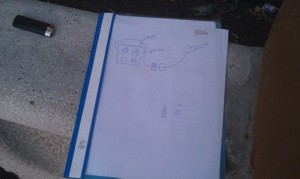
This is a customs document
After 45 minutes the official, a young guy that was into music, came outside and started to smoke. When asked how it was going he replied “slow”, and continued to draw on his cigarette. As a friendly gesture, René gave the guy a cd of his old band, At no Bikini Beach. Within two minutes the translated document was magically presented to another customs officer. Things were looking up. Time passed, border traffic dwindled to a trickle and more and more booths closed. Just our cars were left sitting in the designated area for poor sods. The young guy returned with a new problem. The total of our estimated value of the gear was too high to transport as a group. No further indication of possible solutions. We were getting the distinct feeling a little extra love was needed to be going in the general direction of the customs officers. After a while the young guy indicated to Koen that it might be a good idea for us to buy the older official a cup of coffee. Koen played the game without taking any sidetracks, and asked how much this cup of coffee might cost. 30 Euros would be sufficient.
After 2 and a half hours we were finally driving through Serbia, with a stamped semi-official document that will probably make the other borders easier to pass. By the time we crossed the old bridge to the city centre of Belgrade, the bars were about to close and the little octagonal shops in the streets were not allowed to sell alcohol after 10. Luckily our host Ilija, singer of Petrol, combined his Serbian charm with hard Euros and after a hushed conversation a little door opened at the back of the kiosk and soon after Ilija triumphantly presented two plastic bags filled with cans of beer. Good times at Ilija’s apartment. We discussed touring, music, Serbian women and Arnold showed us his hotpants.
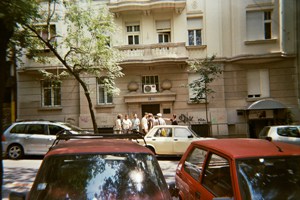
The swish appartment
The next day Koen suggested doing a bicycle tour through the new part of the city. In 2011 Ralph, a friend of his from the Netherlands started the company IBikeBelgrade that employs students to guide tourists around the (Novi Beograd part of the) city by bike. While walking trough the main shopping streets to the bikes Ilija told me about the Kosovo war and NATO’s bombing of Belgrade. When the peace talks between the NATO countries and Serbia failed in March 1999, NATO started bombing strategic targets in Serbia, leaving the city cut off from its water and power supplies. He told me the war unified the people, and while the city was bombed people were partying in the streets. Within a 500 meter radius from Ilija’s apartment ten government buildings were destroyed with smart missiles, while he was sitting at home watching TV. In the end Milošević was forced to give in, as the NATO bombing made life increasingly impossible for the Serbians. Ilija explained that after the conflict was over the old feuds between groups with different political preference in Belgrade were re-established, and things turned back to ‘normal’.
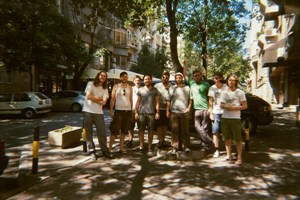
Petrol, Wolvon, Neon Rainbows, Koen
We cycled around Novi Beograd on the other side of the river Sava and learned about the different buildings from Yugoslav times such as Hotel Yugoslavia and the Federal Palace of Serbia. This pompous building once served as the centre of the Non-Aligned Movement, a cooperation between countries, initiated by Yugoslav leader Tito, belonging neither to the “West” or “East”, hosting a strange array of world leaders from Ethiopia to Cuba. We pass the river island Ada Ciganlija where the Belgraders spent most of their free time, and finished our 30 km trip at 18.00. Although the weather was hot the Dutchies were still energized. Our host however dubbed it the ‘heart-attack-tour’ and stayed home to regain strength while we went to the venue where we would do our first show of the tour, finally.
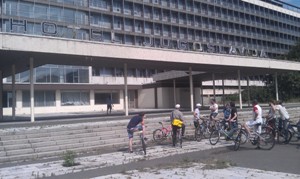
Hotel Yugoslavia
Throughout history Western Europe has often described Balkan culture as backwards and aggressive. Although our encounters with the people thus far proved the opposite, the venue of our first show does its best to put things in a different perspective. We couldn’t drop off our gear until half past 6 because the stage is a shooting range during the day. The venue, aptly named the Gun Club, was scattered with gun shells and the human shaped targets watch over the drummer’s back when playing. We were excited to play this awesome place, owned by the drummer of Darkwood Dub. Our promoter, Jovan, made great effort to make the show a success, arranging everything on a very short notice. Although the place was not packed (nobody arranges gigs indoors in Belgrade during the summer season) we were very happy indeed to be in presence of musicians from great local bands like Petrol and Repetitor.
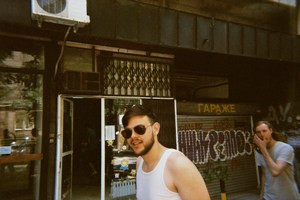
Wolvon – downtown Beograd
Neon Rainbows kicked off; tight as ever, gently swaying the audience with their catchy rock songs into a state of rock ‘n’ roll oblivion. René promoted the CD-R’s with customised artwork they made specifically for this tour, and the audience, although somewhat timid, was definitely having a good time. We were up next and decided to do a floor-show, with myself on the stage, amps behind me, and Ike and Ruben in front of the stage. Apart from some technical difficulties we had a good, somewhat sloppy, show. We got a lot of positive reactions afterwards, and were invited to come to an after-party at the BIGZ building, the breeding ground of the New Serbian Scene.
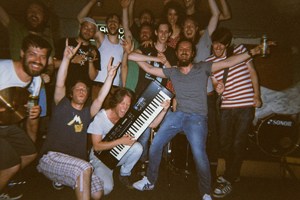
Afterparty at BIGZ
Between 1934 and 1941 the building was constructed to house the National Printing Institution of Yugoslavia, and served as a monumental landmark that represented the power of the Kingdom of Yugoslavia. The place is huge. It’s eleven stories high, with factory sized spaces, containing a variety of different cultural establishments such as a jazz club, music and art studios, a circus and much more. When a club becomes too popular the owner of the building shuts it down, not wanting too much attention. The initial plan was for us to play in one of the clubs, but nationalist hooligans cleaned it out a week ago. People got intimidated and the place was smashed up with baseball bats. As a tourist it’s hard to see the tension that still lurks under the surface of this beautiful city. We hung out in Petrol’s rehearsal space, got drunk on Serbian beer, encountered the most filthy, disgusting toilets of the Balkans and walked back to Ilija’s apartment after the sun had long risen. Great times in a vivid city. We made promises with the Belgradian bands that we’d be back and hopefully play some festivals while we’re at it.
This morning we left for Vranje, a small town in the south of Serbia. We’ll stay the night at an EVS (volunteer) house with people that were doing voluntary projects in the town, in order to enter Kosovo passing the relatively easy eastern border to go to Kosovska Mitrovica tomorrow where we’ll do workshops and a gig the day after. The weather is getting hotter, but Ike, Ruben and Koen still refuse to give in to the forest guard pants (www.magikeenkortebroekaan.nl). The level of the jokes made has reached an all time low, but Ruben’s high-pitched giggling totally makes up for it.
Check out:
Repetitor (Serbian band): http://www.youtube.com/watch?
Petrol: http://www.youtube.com/watch?
iBikeBelgrade: http://www.ibikebelgrade.com/
Gun Club Belgrade: https://www.facebook.com/
